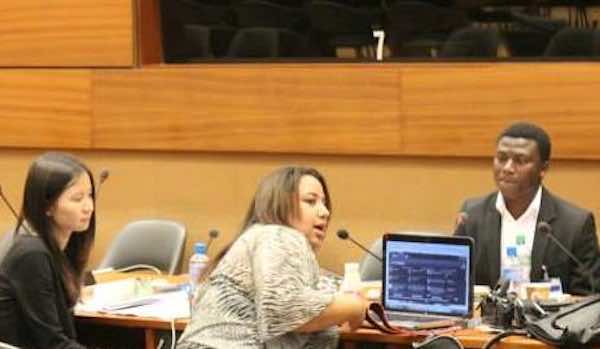
By Rabii Benadada
Casablanca - On Saturday, April 19th, British Polo Day - presented by Land Rover - celebrated its first event on African soil with the inaugural British Polo Day Morocco.
Guests including Sir Richard Branson, philanthropist Eve Branson, Philip Treacy, British Ambassador to Morocco Clive Alderton, US Ambassador to Morocco Dwight L. Bush Sr and a handful of Virgin Galactic astronauts gathered at the Jnan Amar Polo Club for a day of top polo, followed by a Gala Dinner which raised over US$175,000 – a record for the British Polo Day Global Series.
Hosted by the Jnan Amar Polo Club for the benefit of The Eve Branson Foundation, under the High Patronage of King Mohammed VI and the auspices of the Royal Moroccan Polo Federation, British Polo Day entertained over 350 guests and VIPs. Against the backdrop of the majestic Atlas Mountains, guests enjoyed a drinks reception over a quintessentially British game of Brompton bicycle polo - a rather amusing spectacle! Everyone then took their seats in the beautiful traditional Berber tents overlooking the polo field below, for an afternoon of fast-paced polo.
The day’s polo got off to an exhilarating start with the Jnan Amar Cup – a closely-fought encounter between the Royal Salute Eve Branson Commonwealth and Oxford Group Holdings Jnan Amar Rest of The World teams. New Zealand international eight-goaler John Paul Clarkin and his team were on top form from the opening minutes of the first chukka and went on to win the match seven and a half goals to four, despite some serious pressure and very fine play from the Oxford Group Holdings team.
After a delicious afternoon tea, the Hackett British Army took to the field alongside the Moroccan Royal Guard – their first ever encounter – for the Land Rover Trophy. At plus four goals, this was a unique affair and a low scoring game belied the intensity of the play, which resulted in a two goal draw. A fitting end to this first ever match between the two armies.
The day drew to a close at the British Polo Day Morocco prize-giving which took place at one of Jnan Amar Polo Club’s stunning villas – a showcase for the first phase of the Ritz-Carlton Private Residences soon to launch on sale. With the crowds gathered, Sir Richard Branson and his mother, Eve presented the Royal Salute Eve Branson Commonwealth team with the Jnan Amar Cup, while the US Ambassador to Morocco, Dwight L. Bush Sr jointly-presented the coveted Land Rover Trophy to both the Hackett British Army and Moroccan Royal Guard teams.
The Holland & Holland Shot of the Day was awarded to Stuart Wrigley of the Royal Salute Eve Branson Commonwealth team for a high grade shot in the final minutes of the Jnan Amar Cup match. Top British designer Zaeem Jamal then took to the stage to present the eagerly-anticipated Best Dressed prize to glamorous guest, Laura Novell.
The evening’s Gala Dinner took place at Marrakech’s historic La Mamounia. Arriving to a Royal Salute Scotch Whisky and Taittinger champagne reception, guests then sat down for a three-course dinner in the Mamounia’s beautiful ballroom. Then followed a spectacular fashion show by milliner to stars and royalty, Philip Treacy and celebrated womenswear designer Zaeem Jamal.
The Charity Auction proved to be the perfect culmination of the day’s event and raised over a record US$175,000 for The Eve Branson Foundation. The ever-inspiring Eve Branson gave a moving speech on her Foundation and her exciting plans to help a new project village in the Atlas Mountains. Enthusiastic philanthropist, Sir Richard Branson not only invited three lucky guests to play a rather memorable game of doubles tennis with him, but also threw in a surprise additional lot of a week at his exclusive private Necker Island, which of course sparked a bidding frenzy!
Travelling with Abercrombie & Kent, British Polo Day Morocco’s guests not only enjoyed the day itself but an exclusive four-day itinerary taking in some of Marrakech’s most spectacular landmarks. Highlights included: a private preview of Royal Mansour’s new Yahya&Qotbi exhibition, an Atlas Mountains Land Rover Experience – in which guests navigated themselves through the mountains to Eve Branson’s project villages – and the official British Polo Day Morocco medina launch party on the atmospheric rooftop of Riad El Fenn.
Before heading home, Sir Richard Branson personally invited the Charity Auction lot winners to a private Easter Sunday philanthropist lunch at the magical, boutique Kasbah Tamadot. By all accounts the doubles tennis match was of an impressively-high standard and somewhat competitive.
Photo Courtesy British Polo Day
Rabii Benadada is a researcher in sports management at the ISCAE Business School in Casablanca, Morocco
©Morocco World News. All Rights Reserved. This material may not be published, rewritten or redistributed




























